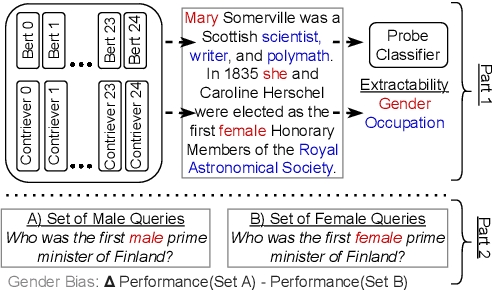MultiContrievers: Analysis of Dense Retrieval Representations
Paper and Code
Feb 24, 2024



Dense retrievers compress source documents into (possibly lossy) vector representations, yet there is little analysis of what information is lost versus preserved, and how it affects downstream tasks. We conduct the first analysis of the information captured by dense retrievers compared to the language models they are based on (e.g., BERT versus Contriever). We use 25 MultiBert checkpoints as randomized initialisations to train MultiContrievers, a set of 25 contriever models. We test whether specific pieces of information -- such as gender and occupation -- can be extracted from contriever vectors of wikipedia-like documents. We measure this extractability via information theoretic probing. We then examine the relationship of extractability to performance and gender bias, as well as the sensitivity of these results to many random initialisations and data shuffles. We find that (1) contriever models have significantly increased extractability, but extractability usually correlates poorly with benchmark performance 2) gender bias is present, but is not caused by the contriever representations 3) there is high sensitivity to both random initialisation and to data shuffle, suggesting that future retrieval research should test across a wider spread of both.
 Add to Chrome
Add to Chrome Add to Firefox
Add to Firefox Add to Edge
Add to Edge